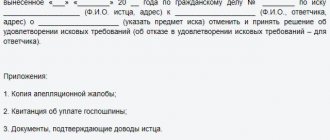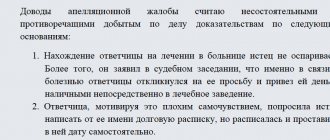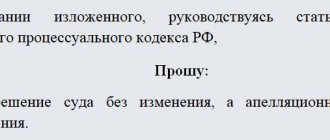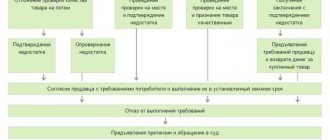What types of cases does the Supreme Court hear?
The Supreme Court plays the role of the main element of supreme power in legal proceedings.
Its jurisdiction includes legal conflicts in the following cases:
- for which administrative responsibility has been established;
- excited when signs of a crime are detected;
- on economic disputes within the jurisdiction of the arbitration court;
- arising in civil legal relations.
As the highest body of the judiciary, the Supreme Court checks the compliance of court decisions with the current norms of procedural legislation and principles of legal proceedings.
In addition, it has the power to administer justice as a court of first instance. This happens if the case has received wide publicity and is actively discussed by the public. And also if the process is characterized by increased legal complexity and labor intensity.
Classification of complaints in the RF Armed Forces
Divisions of the highest judicial body of the Russian Federation are engaged in assessing the compliance of decisions taken with regulatory guidelines.
You can file a complaint against decisions in final form:
- did not have time to enter into legal force (appeal);
- entered into legal force (supervision and cassation).
Conclusions must be made on the basis of evidence examined by the court during the initial consideration of the case. Additional arguments will be taken into consideration if the interested party proves that they could not be presented earlier for objective reasons.
Reasons
In order to cancel or change the outcome of a legal dispute, compelling reasons are needed.
These are considered:
- Incorrect definition or interpretation of applicable laws.
- Gross violations of legal proceedings that make the decision procedurally invalid.
The time limit for filing a complaint with the supreme court depends on the type of complaint. In case of appeal, it is 1 month. In case of supervision - 3 months from the date of entry into force of the decision. For cassation in civil cases, it lasts 6 months, and if the cassation appeal is to the Supreme Court in a criminal case, then there is no time limit for filing.
Complaints are sent to the Collegium of the RF Armed Forces (Judicial or Appeal), as well as to the Presidium of the RF Armed Forces.
Result
The outcome of the appeal may be as follows:
- The verdict is recognized as legal and does not require changes. An example from practice: an appeal was filed to the Supreme Court against a decision of a judge of the city court of the Chuvash Republic in a case of an administrative offense. Having examined the application, the Supreme Court found no reasons requiring the cancellation of the previous decision.
- The court decision is recognized as subject to cancellation in whole or in part. For example, the Supreme Court considered a supervisory complaint filed against the refusal to recognize the last Russian Emperor Nikolai Romanov and members of his family as repressed. As a result of the inspection, the decision adopted in cassation was annulled. The case has been remanded for re-evaluation.
- The application will be refused.
- The application will be returned for revision and correction of errors.
The usual processing time for an application is 2 months if the case has not been claimed.
If it becomes necessary to request case materials from the court that made the decision, the period of proceedings is increased to 3 months. This period can only be changed by the chairman of the Supreme Court or his deputy.
Today, the position of chairman is occupied by Vyacheslav Mikhailovich Lebedev. Deputies and heads of judicial panels are Sergey Valentinovich Rudakov, Vladimir Vladimirovich Khomchik, Pyotr Pavlovich Serkov, Tatyana Anatolyevna Petrova.
How to draw up and where to file a supervisory complaint
The procedure for drawing up and submitting a claim to the highest arbitration authority is strictly regulated by Russian legislation.
There are time limits for filing, which depend on the nature of the case. Important: you can find out the exact criteria and deadlines for a specific issue on the official website of the RF Armed Forces.
The document must include the following items:
- full name of the structure to which the paper is sent;
- applicant's details;
- data on the disputed issue: participants, list of legal procedures completed;
- additionally, all structures (including non-state) participating or related to the case are named;
- the main theses of the contested decision;
- reasons and grounds for appeal.
A sample application can be submitted for consideration in the following ways:
- bring in person;
- send by registered mail;
- send via email;
- write and send in the appropriate section on the department’s website.
At the time of submitting the application, a state fee must be paid. Persons belonging to the following categories are exempt from this obligation: disabled people, WWII veterans, heroes of the Russian Federation or the USSR. Also, payment is not required for claims regulating labor, property and other types of civil relationships.
The document is formed in accordance with the standards of the Code of Civil Procedure. The application form, according to the articles of the code, must be formed from the following information blocks:
- The name of the authority to which the complaint is sent. Placed in the right corner, the top of the sheet. Below it is indicated the full name, address and contact details of the applicant (telephone number, email and physical address). The same block contains information about other persons participating in the process.
- The title of the appeal “Complaint”, indicating the classification: appeal, cassation or supervisory – is located in the center of the sheet.
- The essence of the issue that requires consideration, listing the facts and grounds that allow the previous decision to be considered illegal.
- The next block is a list of additional documents;
- The final stage is the applicant’s signature and date of writing.
To file a complaint with a higher court, you must first pay a state fee. You should be aware that some individuals do not pay the state fee when submitting an application. These include:
- WWII veterans;
- disabled people;
- heroes of Russia, the Soviet Union;
- plaintiffs in various types of claims regulating labor, property and non-property, and other types of relations.
The procedure by which an application is submitted to the highest bodies of judicial power is established by the Arbitration Procedure Code of the Russian Federation and the Code of Civil Procedure of the Russian Federation. According to the articles included in these codes, an application submitted to the court for consideration must include the following points, while observing the structure of writing a complaint:
- In the upper right corner, the name of the receiving structure is first indicated, and then information about the person filing the complaint (full name and address). Also, instead of the applicant, the body or organization filing the claim for consideration of the case (company, prosecutor's office, etc.) may be indicated. Below the information about the applicant is information about the persons who take part in the proceedings carried out before the court, or about the parties to the proceedings.
- The name of the complaint is indicated in the center of the page, for example, CASSATION COMPLAINT.
- The body of the text explains the case being appealed and the reasons why the applicant believes the decision in this lawsuit is unlawful.
- At the end, those documents that are attached to the appeal may be indicated (decision of the lower court, evidence of the applicant’s guilt or innocence and other documents).
- At the end of the appeal, it is necessary to indicate the date the application was written and the signature of the person who wrote the complaint.
The grounds presented in the text of the application must be sufficiently compelling, otherwise the Chairman of the Supreme Court has the right to refuse the applicant to begin the process in his case.
There are four ways to appeal to the Supreme Court of the Russian Federation:
- By submitting an application in person to the authorized body;
- By sending a registered letter to this authority;
- By sending a letter to the department's email;
- Write a complaint to a special section on the official website of the Supreme Court of the Russian Federation.
When drawing up an appeal, the applicant needs to be aware that the time allotted for consideration of the appeal begins from the moment the court receives documentation from the applicant.
The period for considering an appeal against a decision in a case that is made by lower authorities is unlimited, in accordance with the requirements of Russian legislation.
- decisions and rulings of the Supreme Court of the Russian Federation that have entered into legal force, adopted by it at first instance
- on the rulings of the Cassation Board of the Supreme Court of the Russian Federation
- on the rulings of the Judicial Collegium for Civil Cases of the Supreme Court of the Russian Federation, issued by it in cassation proceedings.
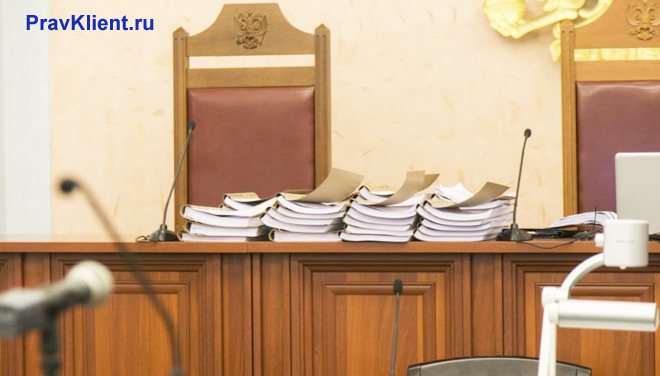
In accordance with Part 2 of Art. 376 of the Code of Civil Procedure of the Russian Federation, court decisions can be appealed to a supervisory court within a year from the date of their entry into legal force. Considering that consideration of a complaint by the presidium of a court of a constituent entity of the Russian Federation (reclamation of the case, appeal to the chairman) can take quite a long time, since the adoption of the Code of Civil Procedure of the Russian Federation, questions have arisen in practice about the procedure for calculating the specified period.
- name of the judicial authority,
- personal data and contacts of the applicant,
- personal and contact information about other participants in the process,
- an indication of all courts that have previously rendered decisions in this case,
- a complete list of available court decisions and decisions reflected in them,
- indication of a violated right or non-compliance with legislation,
- statement of stated requirements,
- date, signature.
- violation of the freedoms and rights of a citizen granted to him by the Constitution of the Russian Federation, international and other legal acts (this can be either the plaintiff himself or the defendant, and other parties involved in the trial),
- violations of public interests, public rights of a wide range of citizens,
- incorrect interpretation and application by judges of the norms of Russian legal acts.
- The judge did not fully examine the evidence in the case;
- All circumstances of the case have not been considered;
- The legal norms were not followed when conducting the case;
- There were inaccuracies, doubts, and contradictions in the trial;
- The evidence was erroneous or false;
- There were inaccurate statements by witnesses;
- The decision was made only on the basis of a document prepared by officials, and the consideration was initially biased towards the accused (he was considered guilty beyond doubt).
A complaint to the regional Supreme Court in an administrative case can be filed indefinitely. The main goal for you is to study the case in detail, find all the shortcomings and violations that may be grounds for filing a claim. To do this, you better engage a qualified lawyer.
Chapter 20. Decision of the arbitration court, Article 167. Decision-making 1. The arbitration procedural law gives the court the right to put its powers in the form of decisions, determinations and regulations.
We suggest you read: How to file a counterclaim in court
A decision is an act of the court of first instance, which, on behalf of the state, in strict accordance with the norms of substantive and procedural law, resolves the case on its merits. Analyzing the rules of paragraph 1 of Art. 167 of the APC should be taken into account.
In the Resolution No. 14-P in the case of verifying the constitutionality of Art. 97 Code of Criminal Procedure (SZ RF. 1996. N 26. Art. 3185). The Constitutional Court recognized this norm as inconsistent with the article under comment. As is known, the Constitutional Court is not authorized to establish the compliance of internal regulations with international treaties of Russia.
However, taking into account that, according to Part 1 of this article, human rights and freedoms in the Russian Federation are recognized and guaranteed in accordance with generally accepted principles and norms of international law, the Court’s opinion on the inconsistency in this case with Art. 97 Code of Criminal Procedure, Part 1, Art.
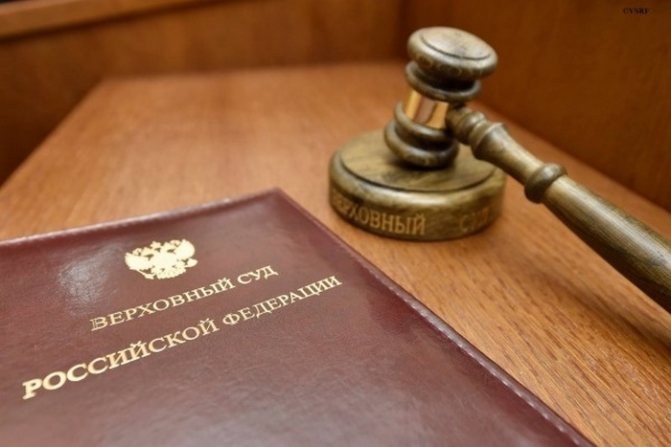
The decision states, “the basis for bringing to administrative responsibility under Part 1 of Article 12.26 of the Code of Administrative Offenses of the Russian Federation is a person’s refusal to undergo a medical examination for intoxication, stated in the protocol on an administrative offense, stated to a traffic police official if there is a legal reason for this.”
According to Articles 27.12, 27.13 of the Code of Administrative Offenses of the Russian Federation, the inspector has the right to demand a medical examination on the spot if he detects signs of intoxication. In the CG report No., the inspector indicated in the column for signs of intoxication “a strong odor of alcohol from the mouth.”
However, in the medical examination report for intoxication No. in column 11 it is stated “There is no smell of alcohol or other substance (which one), speech is not impaired.” From the above, we can conclude that the inspector’s demands to undergo a medical examination were illegal.
On June 27, 2009, a judge of the district court of Moscow considered the appeal of the full name against the decision of the magistrate - the third judicial district of the Moscow region dated May 15, 2009 in the case of an administrative offense provided for in part 1 of article 12.
26 of the Code of Administrative Offenses of the Russian Federation, decided: resolution of the magistrate - the th court district of the Moscow region dated May 15, 2009 in relation to the full name on bringing to administrative responsibility under Part 1 of Article 12.26 of the Code of Administrative Offenses of the Russian Federation in the form of deprivation of the right to drive a vehicle for a period of 1 year 6 months left unchanged, and the appeal was not satisfied.
Filing a complaint to the Supreme Court
Having decided to appeal to the main court of the Russian Federation in cases concerning general jurisdiction, the question arises: “How to file a complaint to the supreme court?” After all, the fate of the appeal largely depends on how correctly it is drawn up.
When filing any complaint, it is important to adhere to the order of appeal to the courts. Failure to comply with the proper procedure entails refusal to consider the appeal. The conditions for filing a complaint are established by the procedural codes of the Russian Federation. These are the Code of Criminal Procedure (Article 401.3), Civil Procedure Code (Article 377), Arbitration Procedure Code (Article 291.1).
If a complaint is sent by a person serving a sentence related to restriction of freedom, then it should be submitted only in a special manner through the administration of the correctional institution. If this condition is ignored, the complaint will not be considered.
A complaint to the Supreme Court in a civil, criminal or administrative case is filed:
- Persons with a personal interest.
- Persons with a public or professional interest. These include representatives of the prosecutor's office, the ombudsman and other officials. If their participation in the process is mandatory.
- Persons who were not directly involved in the process. If the court decision concerns them or their legitimate interests.
- Lawyer of the convicted person.
- Legal representatives of persons entitled to file a cassation.
When applying to the Supreme Court of the Russian Federation, information on the complaint and the results of its consideration is displayed on the state website. structures.
When a repeated complaint is submitted to the Chairman of the Supreme Court of the Russian Federation
An appeal to the Supreme Court of the Russian Federation is not easy in any case, but only if the case was considered in court, after which an appeal took place. The main type of situations that are dealt with in the Supreme Court of the Russian Federation is an application filed for re-examination of the case.
- the most complex, high-profile and high-profile cases that are recognized as such by the Criminal, Civil and Administrative Codes of the Russian Federation. In this case, there is a high probability that the Supreme Court of the Russian Federation will be the primary court considering this case;
- litigation that has been retried several times and not one of the parties is dissatisfied with the resolution of the dispute;
- analysis of those proceedings that were discussed earlier. The received data is processed and systematized, on the basis of which statistical data are generated;
- detailed explanation of the progress and outcome of legal proceedings;
- litigation related to international treaties or international agreements.
We invite you to familiarize yourself with: Objection to an appeal (sample): Deadlines for filing a response to a complaint
The highest court considers appeals, the purpose of which is to challenge a decision made by lower court bodies or the Supreme Court of the Russian Federation itself, which has not yet entered into force. In total, two boards are looking into this issue.
The Board of Appeal is engaged in reviewing proceedings carried out in the Supreme Court of the Russian Federation. The task of a group of boards responsible for criminal, economic, civil, administrative and other types of litigation is to consider cases dealt with at lower levels.
You can also submit a supervisory appeal to the Supreme Court, which examines cases from different regions, territories, republics, etc. At the same time, those decisions that have already entered into force by law are considered. The appeal takes place in the Presidium of the Supreme Court of the Russian Federation, where cases are transferred by authorized panels.
There are several supervisory services within the structure of the RF Armed Forces.
If the court decision is unsatisfactory, the applicant’s request may be either a change in the court decision or its complete cancellation.
It happens that the Chairman of the RF Armed Forces receives a repeated appeal. This is due to the fact that the decision of the Supreme Court of the Russian Federation itself did not satisfy the applicant, so he demands an appeal from the Supreme Judge.
The content and form of the document are the same as in the appeals that were submitted to the RF Armed Forces and did not receive the response the applicant needed. At the same time, the decision made by the Supreme Court of the Russian Federation and compelling reasons why this decision does not comply with the requirements of Russian legislation are indicated.
A prerequisite for filing a claim: the case was considered earlier, but the decision on it does not satisfy the parties or one of them. As a rule, a complaint is an application for re-examination of the issue, if there is a reasoned reason.
- a case in which proceedings have been conducted one or more times, and the results do not satisfy the opponents;
- situations in which a detailed explanation of the proceedings and its outcome is necessary;
- cases the object of consideration of which are international agreements or contracts;
- analysis of repeated requests in order to obtain statistical data;
- processes recognized as resonant in accordance with the Criminal, Administrative or Civil Codes of the Russian Federation.
Additional information: For cases related to the last paragraph, the re-application condition is not required. For them, the Supreme Court may be the primary authority.
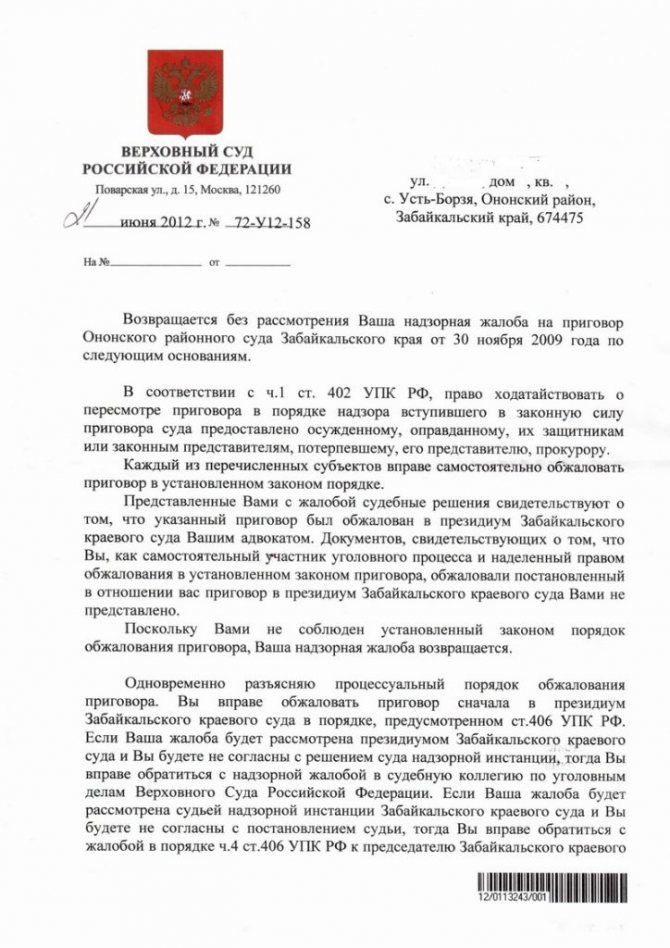
Return of complaint

All incoming complaints are divided into categories and considered by the relevant board:
- Appeal.
- Cassation.
- Supervisor.
The first category includes situations that were rejected in the primary court. At the time of filing an application with the Supreme Court, the case must be under consideration. A complaint to the Chairman of the Supreme Court of the Russian Federation in a civil case is accepted, a sample of which contains the factual basis of the case, as well as the main provisions of the wording.
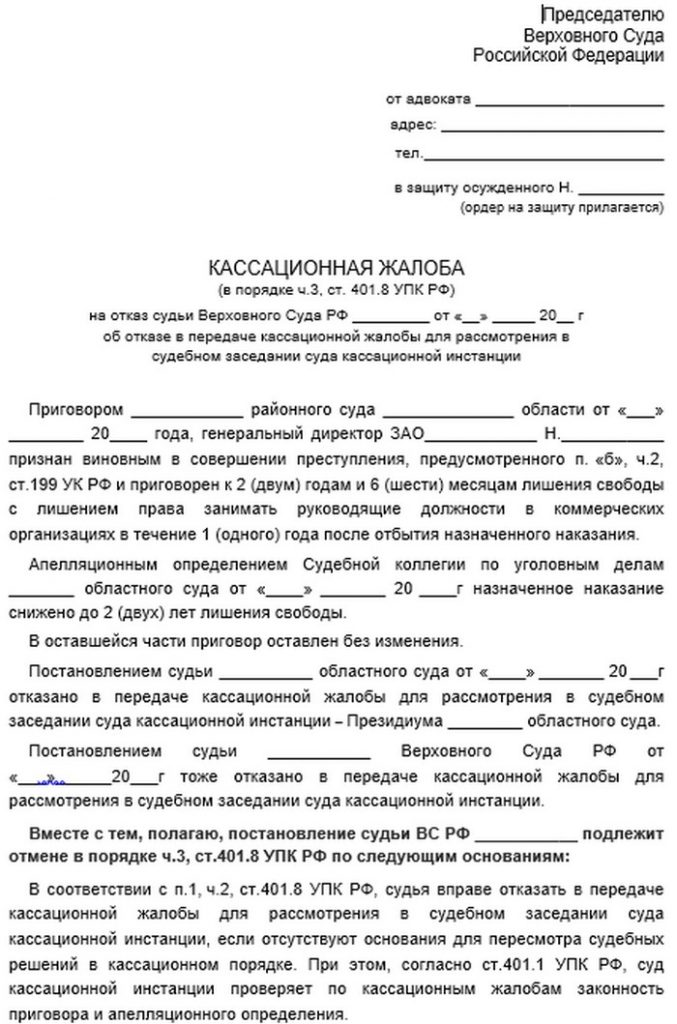
Appeal
Cassation-type statements are used to ensure the legal rights of the parties involved. It is possible to initiate a cassation process if there are new circumstances of the case, as well as the cancellation of a decision made by a lower body.
Unlike the first type, a cassation appeal to the Chairman of the Supreme Court of the Russian Federation is limited by the terms of appeal, and is also subject to a clear procedure. The actions of the Supreme Court, in this case, will confirm or refute the legality of the previous decision.
The last step in the procedure for defending your interests is a supervisory claim. Before filing such a claim, you must go through the appeal stage. Supervisory-type claims are sent to the Presidium of the Supreme Court, whose powers are more extensive compared to related structures. In this regard, a special procedure for filing a complaint has been adopted.
Sample application to the Supreme Court of the Russian Federation
There are a number of legally established conditions for the content and execution of a claim:
- the appeal can be submitted either in handwritten form or printed on a computer; the second option is preferable, since handwritten text cannot always be read;
- the stated requirements must be clearly formulated and must meet the criterion of feasibility; All relevant information about the case is entered into the complaint form;
- the statement is written in free form, but the style of speech should be official and businesslike; The use of profanity and slang expressions is not permitted;
- You need to write briefly, without artistic details and digressions, personal speculation, and subjective assessment.
Also, before submitting an application, a state fee is paid for processing documents and performing legally significant actions.
Sample applications and the amount of state duty can be viewed on the official portal of the Supreme Court. As an example of filling out an application, it is recommended to use documents located on openly accessible websites of electronic legal systems.
Read more: Who pays for the apartment, the owner or the registered owner?
Sample of cassation appeal to the Supreme Court
Filing a complaint to the Supreme Court within the framework of cassation is strictly regulated by the legislator.
The document should have the following structure:
- Introductory part. Contains installation data - this is the name and address of the court (zip code, city, street name, house number, building) to which the cassation is sent, information about the applicant and the persons participating in the process (passport details, address, contact details and their procedural status) .If one of the parties to the case is a legal entity, you must indicate its full details.
- Descriptive part. Information about the judicial act that the applicant wants to challenge (number and date of adoption). In chronological order, information about the courts that considered the case and information about all court decisions made is indicated.
- Motivational part. A list of legal facts on which the applicant bases his claim. With an indication of the violated norms of law and other regulations.
- The pleading part. The applicant’s request to cancel or mitigate the decision or part thereof.
- Final part. Contains a list of applications, date and signature of the applicant. All original documents referenced in the text of the complaint must be included in this list and submitted along with the application.
To draw up, it is recommended to use the sample complaint to the Supreme Court posted on the official website.
Before complaining to the highest judicial authority, it is recommended to study the proper procedure for filing appeals and the rules for their execution.
Conduct a search for precedents and analyze statistical data. If you do not have sufficient knowledge and practice in this matter, it is recommended that you contact a law firm.
Code of the Russian Federation on Administrative Offenses
(extraction)
Chapter 30. REVIEW OF DECISIONS AND DECISIONS IN CASES OF ADMINISTRATIVE OFFENSES
Article 30.12. The right to appeal, protest decisions that have entered into legal force in a case of an administrative offense, decisions based on the results of consideration of complaints, protests
1. Decrees in a case of an administrative offense that have entered into legal force, decisions based on the results of consideration of complaints, protests may be appealed by the persons specified in Articles 25.1 - 25.5.1 of this Code.
2. Decrees in a case of an administrative offense that have entered into legal force, decisions based on the results of consideration of complaints and protests may be appealed by the prosecutor.
3. The right to lodge a protest belongs to the prosecutors of the constituent entities of the Russian Federation and their deputies, the Prosecutor General of the Russian Federation and his deputies, and in relation to military personnel and citizens called up for military training - to the prosecutors of military districts, fleets and equivalent prosecutors, the Chief Military Prosecutor and their deputies.
4. A decision that has entered into legal force based on the results of consideration of a complaint or protest against a decision in a case of an administrative offense may be appealed by the official who issued the decision.
5. A decision that has entered into legal force based on the results of consideration of a complaint against a decision made by a judge in a case of an administrative offense may be appealed by the official who sent the case to the judge for consideration.
Article 30.13. Courts considering complaints, protests against decisions that have entered into legal force in a case of an administrative offense, decisions based on the results of consideration of complaints, protests
1. Complaints are filed, protests are brought to the supreme courts of the republics, regional, regional courts, courts of the cities of Moscow and St. Petersburg, courts of the autonomous region and autonomous districts, the Supreme Court of the Russian Federation.
2. Decrees in a case of an administrative offense that have entered into legal force, decisions based on the results of consideration of complaints, protests are entitled to be reviewed by the chairmen of the supreme courts of republics, regional, regional courts, courts of the cities of Moscow and St. Petersburg, courts of the autonomous region and autonomous districts or their deputies, The Chairman of the Supreme Court of the Russian Federation, his deputies or, on behalf of the Chairman of the Supreme Court of the Russian Federation or his deputies, a judge of the Supreme Court of the Russian Federation.
3. The Supreme Court of the Russian Federation considers complaints, protests against a judge’s decision in a case of an administrative offense that has entered into legal force, decisions based on the results of consideration of complaints, protests against the said decision. The specified resolution and decisions are considered by the Supreme Court of the Russian Federation if they were considered by the chairmen of the relevant supreme courts of the republics, regional, regional courts, courts of the cities of Moscow and St. Petersburg, courts of the autonomous region and autonomous districts or their deputies.
4.1. Decisions of arbitration courts in a case of an administrative offense that have entered into legal force, decisions made by them based on the results of consideration of complaints, protests (submissions), are reviewed by the Supreme Court of the Russian Federation if all methods of appealing them in arbitration courts provided for by arbitration procedural legislation have been exhausted. These decisions are reviewed by the Supreme Court of the Russian Federation in accordance with the rules established by the Arbitration Procedural Code of the Russian Federation.
5. Decrees of a judge of a garrison military court in a case of an administrative offense that have entered into legal force, decisions based on the results of consideration of complaints, protests are reviewed by district (naval) military courts and the Judicial Collegium for Military Personnel of the Supreme Court of the Russian Federation in accordance with the rules established by this Code.
Read more: Application to correct an error in a court order
Article 30.14. Filing a complaint, filing a protest against a decision in a case of an administrative offense that has entered into legal force, decisions based on the results of consideration of complaints, protests
1. A complaint is filed, a protest is brought to the court, which has the authority to review such complaints, protests.
2. A complaint, protest against a resolution in a case of an administrative offense that has entered into legal force, decisions based on the results of consideration of complaints, protests must contain:
1) the name of the court to which the complaint is filed, the protest is brought;
2) information about the person who filed the complaint, the prosecutor who brought the protest;
3) information about other participants in the proceedings regarding an administrative offense;
4) an indication of the resolution in the case of an administrative offense, the decision based on the results of consideration of complaints, protests;
5) the arguments of the person who filed the complaint, the prosecutor who brought the protest, indicating the grounds for reviewing the decisions that have entered into legal force in the case of an administrative offense, decisions based on the results of consideration of complaints, protests;
6) a list of materials attached to the complaint or protest;
7) signature of the person who filed the complaint, the prosecutor who brought the protest.
3. The following must be attached to the complaint or protest:
1) a copy of the resolution in the case of an administrative offense;
2) copies of decisions based on the results of consideration of complaints, protests, if such decisions are made;
3) a copy of the document that certifies the powers of the legal representative of an individual or legal entity, a copy of the power of attorney or an order issued by the relevant legal entity that certifies the powers of the defense attorney or representative, if the complaint is signed by these persons;
4) a copy of the complaint, protest, the number of which corresponds to the number of other participants in the proceedings on the administrative offense specified in Articles 25.1 - 25.4, 25.11 of this Code.
Home » Documents » Complaints » How to file a complaint to the Supreme Court of the Russian Federation in an administrative case?

How to write a cassation appeal correctly: samples
When drawing up a document, you must adhere to the rules established by law regarding its form and content.
Important! K/production has two successive stages. You can apply twice, which increases the chances of a fair decision.
Structure of the application.
Introductory part:
- s/body to which the appeal is written;
- information about the persons involved in the dispute with their contact details;
- number from the case file.
Description:
- title “Cassation Appeal”;
- outline the operative parts of previously approved documents;
- indicate the final act with the date of its adoption.
Motivation:
- the appealed reasons for disagreement with the court verdict;
- specify the violated law;
- justify from a legal point of view.
Resolution:
- application for suspension of proceedings;
- the applicant’s request to cancel (change) the original document.
Appendix: list the papers added to the written appeal. Additional evidence will not be accepted.
Important! Copies of contested legal acts must bear the blue seal of the judicial authority that compiled them.
A ticket/complaint with attached materials can be submitted on the website.
Signature.
A document without a visa or signed by an inappropriate person will not be accepted.
The court of cash/jurisdiction does not accept applications in a short or simplified form. An application drawn up in a reduced volume is sent for correction on formal grounds. Insufficient justification and facts may adversely affect the outcome of the proceedings.
On appeal ruling
The final document of the appellate court is issued in the form of a ruling that comes into force at the time of its announcement. The quality of life is submitted in accordance with the procedural norms of the Code of Civil Procedure of the Russian Federation, the Arbitration Procedure Code, the Code of Criminal Procedure, and the CAS.
In a civil case
In cassation of general jurisdiction the appealed acts adopted are considered:
- At first instance - by a magistrate judge.
- For the first and second instances:
- district (city) court;
- Armed Forces of the Republic;
- regional, regional court;
- with/instance of the federal city;
- court of autonomous regions (districts).
The state fee for consideration of the case is calculated in accordance with the provisions of the Tax Code.
Having examined the application materials, the judge makes a determination:
- accept;
- send for revision;
- return.
According to criminal
In the document, indicate errors made in the application of the norms of the Criminal Code, Code of Criminal Procedure, which influenced the punishment for the offense committed.
When submitting an application for a resolution that affects the interests of citizens who have not previously participated in meetings, it is necessary to specify and justify the violations.
According to administrative
In relation to offenses under the Code of Administrative Offences, applications are submitted in accordance with the Civil Procedure Code and the Arbitration Procedure Code.
In public disputes, preparations are made for appeals in cases that have passed the courts of the first and second instances under the CAS. It can be sent electronically, with confirmation of familiarization by the participants (state and local structures) through their official websites.
To the Supreme Court
In the following order, applications are submitted to the collegium of the RF Armed Forces:
- in civil cases;
- in criminal cases;
- for administrative purposes.
Judicial acts adopted by:
- At first instance - against decisions of district (city) courts.
- For the first and second instances:
- Armed Forces of the Republic;
- s/organs of the region, region;
- courts of federal cities;
- autonomous, regional (district) courts;
- general jurisdiction appeal;
- At the third instance - by cassation of general jurisdiction.
After reviewing the materials of the cash register/complaint, the judge makes a ruling:
- Refusal to review. The Chairman of the Supreme Court or his deputy may, on their own initiative, re-evaluate the definition and accept it for consideration.
- On transfer for study to the appropriate board.
In arbitration
Civil disputes of an economic nature are resolved. When filling out an application, you should pay attention to the details of legal entities and individual entrepreneurs requested from the tax authorities.
Samples of complaints in administrative cases to the Supreme Court of the Russian Federation
ATTENTION! Look at the completed sample of an appeal to the Supreme Court of the Russian Federation in an administrative case:
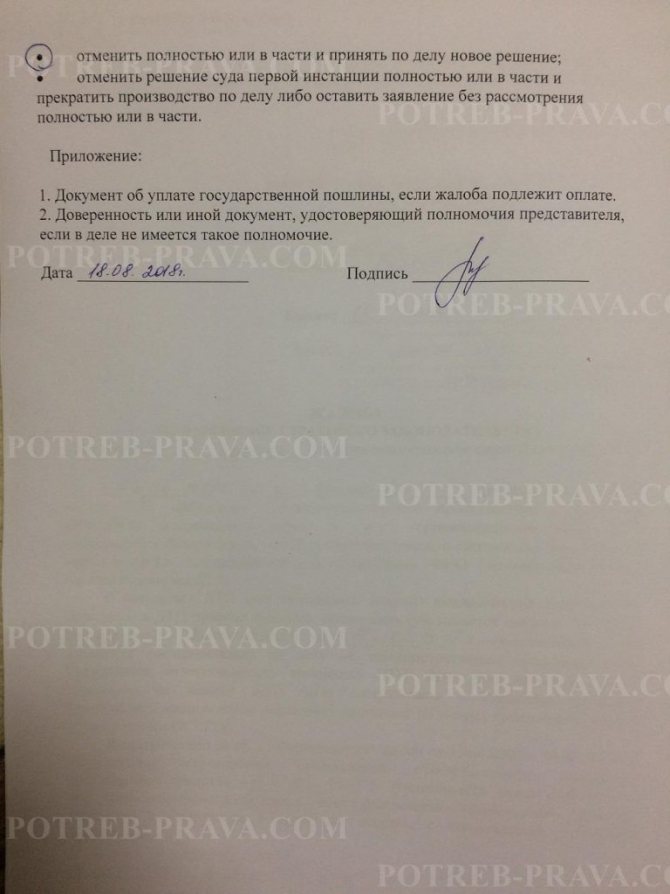
You can DOWNLOAD samples of complaints to the Supreme Court of the Russian Federation using the links below:
Grounds for appealing to the Supreme Court
According to statistics, 50% of citizens are not satisfied with the decision made by a special body. It seems unreasonable and illegal. In this case, the decision is appealed to a higher court. There may only be a few reasons for a person to appeal a decision to the Supreme Court.
We list the main ones:
- the evidence presented is false or obtained illegally;
- witnesses are convicted or suspected of perjury;
- only part of the circumstances of the case has been considered;
- the judge's lack of knowledge of the case materials;
- negative attitude towards the defendant during the hearing. Ignoring evidence confirming innocence;
- violation of laws during the process;
- the presence of inaccuracies and different testimony during the proceedings.
Appeal in administrative cases
The decision on the administrative case comes into force through:
- 1 month - in the general procedure for consideration;
- 15 days - under a simplified review procedure.
The complaint is filed within this period of time, that is, before the decision enters into legal force. The sooner this is done, the better. Article 298 of the Code of Administrative Proceedings provides for a number of exceptions with different deadlines. For example, cases of placement of foreign citizens in a special institution are submitted within 10 days from the date of consideration by the relevant body.
Attention! If the deadline to file a complaint has expired, do not despair. A request for an extension of time must be attached to the petition. In addition, directly in the main part of the text, you can indicate a request to provide the opportunity to make a statement with a missing time frame. The court has the right to return the complaint to the applicant if there is no clarification about the extension.
Read how to file a private complaint against a court ruling in an administrative case here.
The complaint is considered by the general composition of the court in accordance with the provisions of the law. The plaintiff, defendant, and third parties are notified of the results.
This document is studied by the Supreme Court of the Russian Federation for about 3 months from the date of receipt. Other courts consider similar papers in administrative cases within 2 months.
The process itself takes place in a collegial manner, that is, consisting of three judges. The event is presided over by the chief judge. It may be difficult to provide additional and new evidence. It is necessary to prove the impossibility of presenting them to the court of first instance.
A citizen has the right to file complaints on behalf of a representative. In this case, his contact information must be indicated. In addition, third parties may become involved in the process, that is, people whose rights were also infringed by an unfair decision of the government.
Please note! The appeal must include the following information:
- full name of the Supreme Court and its address;
- last name, first name, country and current place of residence. If the application is made by a citizen without a fixed place of residence, this information is indicated;
- contact details of the defendants (name and address);
- information about the judicial authority that heard the case previously. If this is an organization, the location is indicated;
- list the requirements in detail. The applicant is obliged to indicate the reasons for drawing up the complaint, articles of legislative acts confirming the existence of a violated right. You also need to briefly list all the evidence and arguments in favor of your own position.
In the final part, be sure to indicate the desired fate of the solution:
- cancel;
- change in whole or in part;
- reconsider the case;
- publish something new.
The CAS of Russia, namely Article 310, lists all the reasons for canceling the trial. They need to be studied if you expect such a result. The main evidence and copies of the attached documents remain in the attachment. At the end the applicant’s signature is placed. If a citizen has a representative, a power of attorney is attached.
Read more: How to calculate parental fees for kindergarten
The number of copies depends on the number of persons in the proceedings. Legal costs are paid by the applicant out of his own pocket.
Watch the video. Appealing court decisions:
Subtleties of the procedure
Everyone has the opportunity to appeal controversial cases in this instance. However, for this process to be effective, it is necessary to take into account the features and subtleties. It is important to adhere to the deadline within which you can file a complaint - one year from the date of the previous verdict.
It is also important to find and provide compelling reasons for the appeal. All facts that could influence a positive court decision should be supported by documents and submitted along with the application.
Return of complaint
Decisions made by the Supreme Court can be challenged again. Many people are concerned about whether the president can overturn a Supreme Court decision. According to current legislation, the head of the Russian Federation does not have such powers.
Appealing to a higher authority is a responsible undertaking, the outcome of which largely depends on the preparation for it. It is important to meet the submission deadlines, draw up the document correctly and support it with evidence.
Applicants or their representatives need to be aware that filing an appeal to a higher court is possible in cases where no more than one year has passed since the last decision in the case made by a lower court.
Before starting to file a complaint, you need to make sure that the decision of the case made by the lower authority is illegal. If the arguments are not sufficiently substantiated by law, then, most likely, its consideration will be immediately refused.
When drawing up a document, it is necessary to include in the main part of the text references to legal acts that prove the incorrectness of the decision made by the previous authority.
Thus, filing an appeal with the Supreme (Arbitration) Court of the Russian Federation seems possible to any citizen who seeks to appeal multiple decisions of lower courts, which provided rulings that do not comply with the requirements of Russian legislation.
In addition, the Supreme Court of the Russian Federation is represented not only by a body that continues to consider decisions made in lower courts, but also by the primary judicial body, which has the right to consider particularly high-profile and high-profile cases.
If the arguments are justified, then there is a high probability that the application will be subject to appeal, and, moreover, will be challenged in accordance with the grounds of the legislation of the Russian Federation.
Cassation appeal
This procedure exists to consider decisions that have passed the appeal stage.
The complaint must be filed within 6 months from the first decision in the case.
If the deadline was missed, the paper is submitted with an attached petition for the missed deadline. A person must have a valid reason for such treatment. For example, hospital treatment or military service. In support of the application, special documents are attached, for example, a certificate from a medical institution.
The right of cassation is enjoyed by participants in appeal proceedings and other persons whose rights have been violated. The second category of citizens has the opportunity to file a complaint of this category only in cases where the prosecutor was present at the previous trial.
Usually cassation appeals are filed with the Presidium of the court. However, if the judge considering the appeal makes an unmotivated decision that contradicts the letter of the law and does not suit the citizen, then it is necessary to contact the Judicial Collegium of the Supreme Court of the Russian Federation. The content of this complaint is virtually identical to the appeal.
You must specify:
- name of the authority and its address;
- own contact details and information about other participants in the process;
- the body that previously considered the case;
- basic information on the case;
- attach evidence and copies of documents.
You must also provide a copy of the previous court decision. It won't be difficult to get it. Simply contact the office. They will quickly find the required document and give it to you for your own purposes.
A citizen is required to pay a state fee, which compensates for legal costs.
The complaint is considered by the Supreme Court within:
- 2 months if the case is not claimed;
- 3 months if the matter was claimed.
Please note! Sometimes the court is authorized to extend the period for consideration of a case if it is complex. The period cannot be extended by more than two months.
After consideration of the complaint, the case is either sent for examination by the court or sent back to the applicant. Cassation is examined collegiately based on the largest number of votes. Participants must be notified of the process.
Having examined the evidence provided, the court makes one of the following decisions:
- ignore the complaint, do not change the judicial act;
- cancel the decision or part of it and send the case for a new trial;
- cancel only some acts issued by the court;
- do not consider the complaint if there are certain errors in the preparation of the document. A complete list of reasons can be found in Article 321 of the CAS of Russia.
Attention! Our qualified lawyers will assist you free of charge and around the clock on any issues. Find out more here.
Deadlines for filing
At the same time, if the appellate court refuses to satisfy the application for an additional appeal ruling, the period for filing a cassation appeal is calculated from the day following the day the main appeal ruling is issued.
When considering an application to restore the deadline for filing a cassation appeal or presentation, the court does not have the right to enter into a discussion of the issue of the legality of court decisions in respect of which an application to restore the deadline for appeal was filed, but must examine arguments about the presence or absence of valid reasons for missing the procedural deadline.
It should be borne in mind that the application for restoration of the term can be satisfied if circumstances that objectively exclude the possibility of filing a cassation appeal or presentation occurred within a period no later than one year from the date the appealed court decision entered into legal force (Part 4 of Article 112 Code of Civil Procedure of the Russian Federation).
In the ruling on restoration or refusal to restore the period for filing a cassation appeal or presentation, the court must set out the reasons for the decision.
If, after the issuance of the appeal ruling, the appellate court considers the appeal, submissions received from other persons for whom the period for filing appeals, submissions was restored, the six-month period for appealing court decisions that have entered into legal force should be calculated from the day following the day the latter was adopted appellate ruling.

